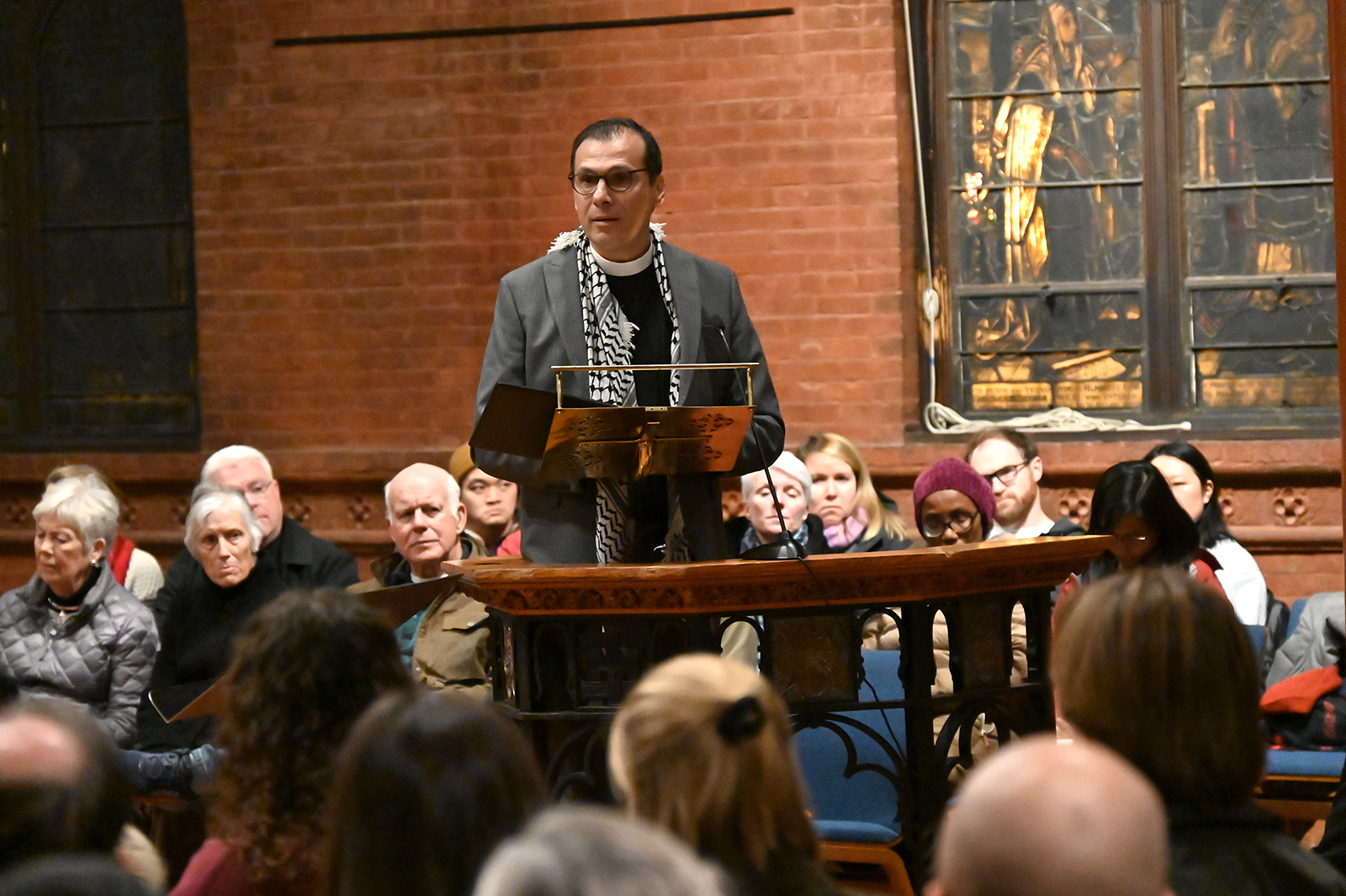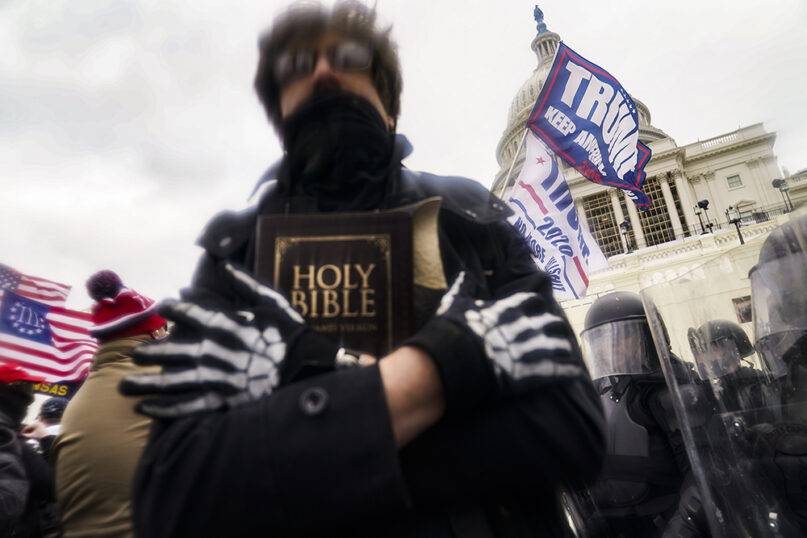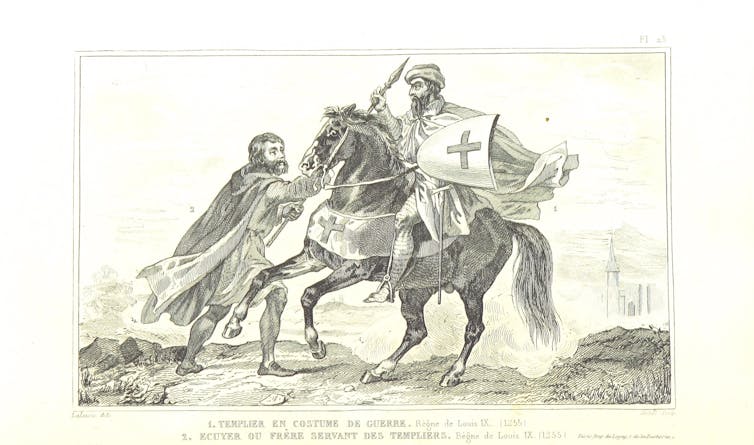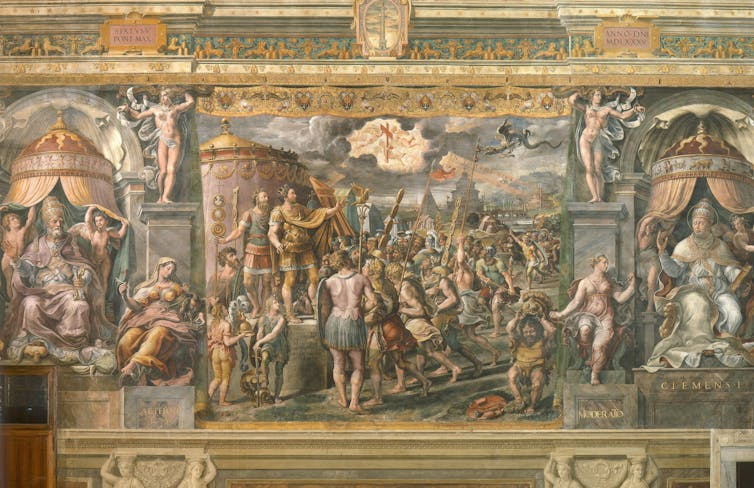‘A core practice of nonviolent resistance, including within our tradition, is economic non-cooperation with injustice,’ the Christian organizations wrote.

May 29, 2024
By Aleja Hertzler-McCain
(RNS) — Amid global outrage over an Israeli airstrike that killed at least 45 displaced Palestinians sheltering in tents in Rafah, a coalition of Christian groups is calling for a boycott and divestment of companies “supporting Israel’s military oppression of Palestinians.”
“As Christians, we seek to illuminate the sacred dignity of all people. We have tirelessly advocated for our U.S. government to stop the mass slaughter in Palestine,” the organizations wrote in a Wednesday (May 29) statement.
“Yet, more leverage is needed,” the statement continued.
Citing the New Testament story of Jesus overturning sellers’ tables in the Temple, the organizations called “economic non-cooperation with injustice” a core practice of nonviolent resistance within the Christian tradition.
The letter links to a list of companies that American Friends Service Committee, a major advocacy organization for Quakers, has identified as involved in specific human rights abuses in the Palestinian territories and Israel.
The signatories of the letter include the Alliance for Baptists, American Friends Service Committee, Christians for a Free Palestine, Friends of Sabeel North America, Israel/Palestine Mission Network of the Presbyterian Church (U.S.A.), Palestinian Christian Alliance for Peace and Pax Christi USA.
More than 36,000 people have been killed and more than 81,000 injured in Gaza, according to health officials there, since Israel began a military operation in Gaza after the Oct. 7 Hamas attack on Israel, which left an estimated 1,200 people dead and more than 200 taken captive.

Palestinians inspect the damage of buildings destroyed by Israeli airstrikes on Jabaliya refugee camp on the outskirts of Gaza City, Oct. 31, 2023. (AP Photo/Abdul Qader Sabbah, File)
Eli McCarthy, a peace activist involved in organizing the letter, said organizers had already heard from additional Christian organizations interested in pledging to join the collective boycott efforts, including the United Church of Christ Palestine Israel Network.
“The Christian call to boycott and divestment deepens our practice of active nonviolence. It illustrates how the way of nonviolence challenges us to withdraw our cooperation from the resources and material power which enable injustice and mass atrocities,” McCarthy told Religion News Service in an email.
The letter also specifically highlights a boycott campaign against Chevron organized in part by the American Friends Service Committee as well as anti-fossil fuel advocacy groups. “The Chevron corporation supplies Israel’s war machine with light and power via the operation and co-ownership of the major gas fields off the coast of occupied Palestinian land,” the organizers of the Chevron campaign wrote on their campaign page.
Chevron began producing natural gas again on a platform 12 miles offshore from the Gaza Strip about a month after Hamas’ Oct. 7 attacks, according to The New York Times.
Judy Coode, communications director for Pax Christi USA, told RNS: “We have to keep doing creative and more significant actions to have a real change in the Middle East. We support any nonviolent effort to draw attention to this issue and make people in this country aware of how we’re connected to this crisis.”
The Christian organizations, which have all previously been involved in peace activism in various ways, are also advocating for a military embargo, which they explain would involve governments, unions and universities ceasing to do any business with Israeli military and security companies.
The letter comes after more than 3,000 people, including college students and professors, were arrested at protests calling for universities to divest from Israel. It also comes a week after the prosecutor of the International Criminal Court requested arrest warrants for war crimes and crimes against humanity for Israeli and Hamas leaders.
The effort echoes an international strategy known as BDS, or Boycott, Divestment and Sanctions, which aims to exert economic and social pressure on Israel’s government to force it to uphold Palestinian rights. The movement draws inspiration from the boycotts used during the fight against apartheid in South Africa. However, the Christian letter organizers emphasize that they are not calling for sanctions, which makes their strategy different from BDS.
The Anti-Defamation League and other pro-Israel organizations have denounced BDS as antisemitic because they argue that the movement calls for “the eradication of the world’s only Jewish state.”
Despite those concerns, several Christian denominations, including the Presbyterian Church (U.S.A.), the United Church of Christ and Mennonite Church USA, as well as the United Methodist Church’s pension board, have all approved specific divestment measures long before Israel’s current military campaign.
In the letter, the Christian organizations write, “This strategy of nonviolent non-cooperation is not against the existence of the state of Israel, but is for the sacred dignity, well-being, security, and human rights of all Palestinians as well as Israelis.”
This article has been updated to clarify that the letter’s organizers are only calling for boycott and divestment, not sanctions.
Opinion
At ‘Christ at the Checkpoint,’ Palestinian Christians rail against Western church’s response to war
Attendees at a conference called for global church leaders to be held accountable for one-sided support for Israel

Attendees listen to a presentation during the biennial Christ at the Checkpoint conference at Bethlehem Bible College in the West Bank in late May 2024. (Photo by Alaa Khoury/Bethlehem Bible College)
May 30, 2024
By Daoud Kuttab
(RNS) — Daniel Bannoura, a Palestinian and a Ph.D. candidate in theology at the University of Notre Dame, was disappointed in Russell Moore. Bannoura had been reading the Christianity Today editor-in-chief’s recent book, “Losing Our Religion: An Altar Call for Evangelical America,” in which Moore bemoans Christian nationalists’ rejecting Jesus’ Sermon on the Mount as “weak.” At the same time, Bannoura said, Moore had failed to consider the Sermon on the Mount in his Oct. 7 commentary in his magazine, justifying Christian support for Israel’s war on Gaza.
“How can you quote ‘love our enemies’ when you are supporting bombing them? How can you talk about just-war theory?” Bannoura asked the audience crowded into the auditorium at Bethlehem Bible College, in the West Bank, on May 24 at the biennial Christ at the Checkpoint conference.
Noting that Moore serves on the council of The Gospel Coalition, Bannoura chided him for his association with a group that compared Hamas to the Amalekites, the biblical enemies of the Israelites, before Israeli Prime Minister Benjamin Netanyahu made the comparison as justification for annihilating Hamas.
“Maybe Russell hasn’t read his own book, maybe, like MAGA Christians, he also thinks the Sermon on the Mount is too weak,” said Bannoura.
RELATED: On Nakba Day, some Palestinians dream of a single, secular state
The divide that has opened during the Israel-Hamas war between Christians in the Holy Land and Christians in the West was a prominent theme at Christ at the Checkpoint, held May 22-26 this year under the banner “Do Justice, Love Mercy,”
The Rev. Munther Isaac, pastor of the Evangelical Lutheran Christmas Church in Bethlehem, and the Bible college’s academic dean, said the past seven months have created a huge chasm between Palestinian Christians and the global church.

The Rev. Munther Isaac, pastor of Bethlehem’s Evangelical Lutheran Christmas Church, addresses a vigil at St. Mark’s Episcopal Church in Washington, Nov. 28, 2023. (RNS photo/Jack Jenkins)
Isaac called for a more vocal action to hold Western church leaders accountable. “We need to be more strategic. General calls are not enough. We need to think of specific calls, such as a possible campaign against Christianity Today signed by evangelical leaders.”
Bannoura, who is on the conference’s steering committee, urged his colleagues to issue a strongly worded rebuttal to evangelical leaders like Moore who have defended Israel.
That document, “A Call for Repentance: An Open Letter from Palestinian Christians to Western Church Leaders and Theologians,” quickly garnered backing from Christian Palestinian leaders. Posted on Change.org, the petition quickly received more than 21,500 signatures.
This year’s conference, which drew about 250 participants from around the world, took place despite challenges presented by the war’s security measures. Israel turned back two South African registered members at the King Hussein Bridge, the only operating land entry point to the West Bank. An American participant was refused entry at the Tel Aviv airport. (Isaac, his travel permit revoked by the Israeli government due to his activism, was not allowed to make a visit to Jerusalem with other conferees.)
Those who were able to attend heard a wide range of speeches and participated in workshops with such titles as “Mobilizing for Peace in the U.S.,” “Reconciliation to Coexistence” and “Media Bias in Coverage of the War on Gaza.”

George and Sara Salloum, of North Carolina, pose with letters of hope they brought to the 2024 Christ at the Checkpoint conference at Bethlehem Bible College in the West Bank. (Photo by Alaa Khoury/Bethlehem Bible College)
Varsen Aghabekian, the first member of the Palestinian cabinet from the Armenian Palestinian community, read Palestinian Authority President Mahmoud Abbas’ address to the conference, saying, “Peace will prevail when questioning the plight of Palestinians for self-determination and accessing their rights is not understood as anti-Jewish, antisemitic or an attempt to demonize or delegitimize Israel, which has been recognized by Palestinians on 78% of historic Palestine.”
The speech, the sole nontheological presentation at the conference, nonetheless appealed to the audience in familiar terms: “We all need to expend effort to maintain hope,” the address declared. “Hope in a better future where there is no occupation of another people’s land, and when the Bible is used for promoting peace rather than war, killing and suffering.”
Jack Sara, president of the Bethlehem Bible College, also spoke in terms that any Sunday school child would understand. Repeating one of the best-known Bible verses, he said many Western church leaders seem to have forgotten its words. “’For God so loved the world’ also includes Palestinians,” Sara said. “God’s love for all includes Palestinians and is not conditional.”
But the Christian gathering pointed to solutions, and healing. Salim Munayer, founder of the Jerusalem nongovernmental organization Musalaha, which facilitates reconciliation between Israelis and Palestinians, noted the significant power imbalance in the conflict. “An honest diagnosis reveals we are dealing with settler colonialism aimed at eliminating the other,” Munayer said.
Effective reconciliation, he argued, must therefore be twofold: It must both restore relationships and address systemic injustices. “Without tackling these root issues, any efforts at reconciliation will merely perpetuate victimization,” Munayer asserted. “For true reconciliation, we must confront the reality of the situation and the structures of injustice nonviolently. This requires a change in attitude and approach, especially among fellow Christians.”

Daniel Bannoura, from left, the Rev. Fares Abraham and Lamma Mansour participate in the 2024 Christ at the Checkpoint conference at Bethlehem Bible College in the West Bank. (Photo by Alaa Khoury/Bethlehem Bible College)
Fares Abraham, the Palestinian American CEO of Levant Ministries, made a passionate call for a “Christ-centered response,” saying, “Followers of Christ can’t ignore the suffering in Gaza.” But he expressed regret for all the deaths that have led to the current situation. “We mourn every loss of life. We mourn those killed on Oct. 7,” he said, “and we pray for the release of the hostages, and we mourn all Palestinians killed in this war.”
Abraham, who said 25 members of his wife’s family have taken refuge in Gaza’s churches, insisted that his call for compassion for both sides should not be controversial. “This is who we are as Christians,” he said. “We need to follow Christ’s example and respond biblically to human suffering with unconditional compassion.”
The calls for a Christian response to the war were present in the 100 handwritten messages of hope and support for the church in Palestine that an American couple from North Carolina, Sara and George Salloum, delivered to the conference organizers, who posted them at the Bible college and sent copies to the churches in Gaza.
RELATED: Latin Patriarch Pizzaballa’s visit provides Palestinians a basic human need: Hope
But there was a more defiant strain of hope in some of the speeches. Lamma Mansour, a researcher in social policy at the University of Oxford and a Rhodes scholar, called on Palestinians to become an example of hope. “Not the naive kind of hope but the hope with power to be bold, to defy arrogance of the oppressor and hope that speaks truth to power.”
Mansour noted that “hope gives us the power to defy the arrogance of oppression and to persist. It renews our strength to love our enemy and to keep protesting, and hope gives us the power to imagine.” Her concluding words brought a standing ovation: “We may be persecuted, and hope ensures us that we will not be abandoned.”
(Daoud Kuttab is an award-winning Palestinian journalist from Jerusalem and the publisher of Milhilard.org. The views expressed in this commentary do not necessarily reflect those of Religion News Service.)
Will mainline leaders be swayed by their silent pro-Israel majorities?

Palestinians wait for aid trucks in central Gaza Strip on May 19, 2024.
May 29, 2024
By Motti Inbari, Kirill Bumin
(RNS) — Mainline Protestant churches are often linked in the media to support for the progressive agenda — same-sex marriage, for instance, and abortion access — and their clergy are increasingly active on racial inequality, civil rights and environmental issues. But over the past few decades, they have also become significantly more pro-Palestinian than the average American when it comes to the Israeli-Palestinian conflict.
With the collapse of the Oslo peace process in 2000, mainline criticism of Israel exploded. Since 2004, the Boycott, Divestment and Sanctions movement has made a significant breakthrough among mainline churches, with 10 resolutions supporting divestment passed by clergy and their most involved lay leaders at their denominational conventions. The United Methodists at their General Conference just last month passed such a vote, following the lead of the Presbyterian Church (U.S.A.) and the United Church of Christ, which did so in 2014 and 2015, respectively.
Pastors and their parishioners are typically assumed to be aligned on these types of issues, but our most recent national survey examining American Christian opinions about Israel and the Israeli-Palestinian conflict reveals that 80% of mainline attendees have never even heard of the BDS movement and only 7% support it. The views of the clergy on these issues, in other words, are often out of sync with the views of the congregants.
Since 2018, we have surveyed the public opinion of different U.S. Christian movements to understand their views of Jews, Israel and the Israeli-Palestinian conflict. For this most recent survey we reached 2,000 self-identifying Christians in the United States in March 2024, months after the start of the war in Gaza. The survey polled evangelical and born-again Christians (such as Baptists and Pentecostals), mainline Protestants and Catholics.
RELATED: Survey: Mainline clergy are more liberal than their congregants
Despite their lack of knowledge about BDS, mainline Protestants tend to be the best informed about the conflict, with a larger percentage of them correctly identifying the Jordan River and the Mediterranean Sea as the ones in the chant “Palestine will be free, from the river to the sea” (49% versus 44% for evangelicals and 39% for Catholics).
We were both surprised and encouraged that this group had not been swayed by the prevailing anti-Israel media narrative. In fact, 22% of mainline respondents said their support for Israel increased as a result of the ongoing war between Israel and Hamas, while 47% said their support remained the same. A majority of this group — 54% — blame “mostly Hamas” for the current war in Gaza, the highest percentage among the three groups that we surveyed.

“In relation to the Israeli-Palestinian dispute, where do you place your support?” (Courtesy graphic)
Half said the Israeli response had been mostly justified, almost 7% higher than the evangelicals who said so.
As these numbers show, the congregants of this important Christian movement clearly support Israel over the Palestinians, as most Americans do, and see greater justification for the Israeli, rather than Palestinian, actions in the current war in Gaza.
RELATED: Are white evangelical pastors at odds with their congregants? A new study says no.
As mainline denominations continue to respond to the war, it is certain to generate heated discussions. The calls for more resolutions condemning Israel, more boycotts of Israeli businesses and more divestment of funds will likely follow.
Will the mainline leaders be swayed by the vocal minority of their pro-Palestinian members, or heed to the significant but silent pro-Israel majority?
(Motti Inbari is a professor of Jewish studies at the University of North Carolina at Pembroke. Kirill Bumin is associate dean of the Metropolitan College and director of summer term at Boston University. They are the authors of “Christian Zionism in the Twenty-First Century: American Evangelical Public Opinion on Israel.”















